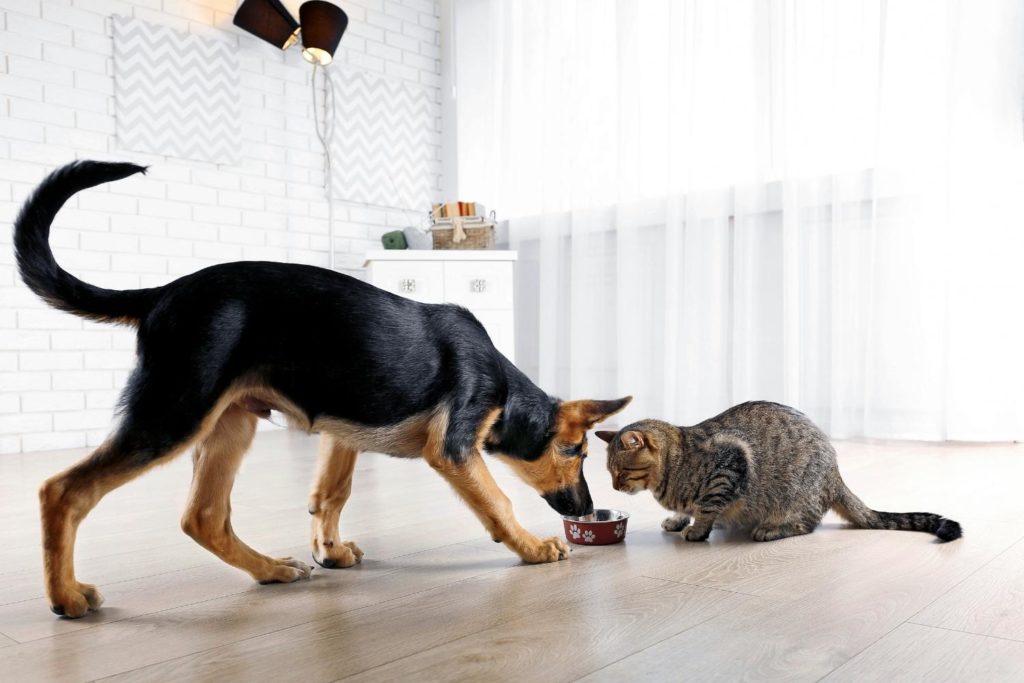
Dogs and cats are both carnivores, but their diets differ in some ways. Dogs are scavengers and eat almost anything, while cats are obligate carnivores, requiring animal protein to survive. As a result, cats usually won’t eat dog food, and vice versa. But what happens if a dog eats cat food? Is it harmful?
Believe it or not, the consequences could be dire if a dog costume cat food consistently.
It’s essential to keep your pet’s diet and nutrition in mind. So let’s find our dogs can eat cat food safely or are they better off sticking to their food?
We recommend you to read about the best non prescription cat food for kidney disease to get a better understanding of this disease and also to know the requirements of your cat when suffering from kidney problems.
How the Cat Food Will Hurt My Dog?
If your dog manages to sneak a meal from your cat’s dish, it could suffer unpleasant consequences.
The most common problem is pancreatitis (inflammation of the pancreas).
Cats and dogs process proteins differently, and proteins make up meat.
Proteins aren’t all broken down in the stomach. Instead, they go further down the digestive system and eventually end up in the pancreas, where they begin to build up.
The pancreas is responsible for breaking down proteins, so when your cat’s food goes unprocessed to this gland, it gets overwhelmed and can become inflamed.
5 Possible Complications for Dogs Consuming Cat Food
Here are the top five complications that your dog may have:
1. Obesity:
After your dog experiences the initial shock of unprocessed protein, they’ll work twice as hard to process what they’ve eaten.
Although each meal doesn’t contain that much cat food, it can add up and strain their body over time.
When too much protein is introduced at one time, dogs can become obese, leading to more health problems down the line.
2. Vomiting:
If fat cells develop in your dog’s pancreas, they may vomit since their body won’t be able to break down the unprocessed food particles.
Your pet may also suffer from nausea and could ultimately refuse to eat. Can dogs eat cat food? It’s not recommended.
3. Diarrhea:
If your dog overeats the wrong type of food, it can develop Diarrhea.
If proteins are building up in their pancreas, it is difficult for them to push the food out of their system.
They may also experience pain when they try to poop, which can cause them to strain.
4. Pancreatitis:
If the pancreas becomes inflamed, it won’t be able to do its job correctly and can even lead to pancreatic failure.
Your dog may experience symptoms of pancreatitis like vomiting and Diarrhea.
5. Nutritional Deficiencies:
Dogs are omnivores. They need a well-balanced diet of plant and animal proteins, fat, vitamins, minerals, and carbohydrates to survive.
Cats are obligate carnivores, meaning they only require animal protein in their diets. However, since dogs can’t process proteins, they may suffer from nutritional deficiencies over time.
What Can Be Done?
If your dog eats cat food, take them to the vet immediately.
Your veterinarian can provide you with medication and dietary supplements that will ease the side effects until their body returns to normal levels of protein processing.
Call your vet if you notice any of these symptoms: abdominal pain; black, tarry stool; constipation; coughing up blood; depression; Diarrhea; difficulty breathing; fever and vomiting.
Why My Dog Ate Cat Food and Threw Up?
There is always the chance that your dog will eat something they’re not supposed to. But, a few times, it might be okay.
If you notice that your pet has eaten cat food, rest easy, knowing that most dogs won’t experience serious complications.
But if they start to throw up or develop Diarrhea over time, it could be a sign that they’ve eaten something they shouldn’t have.
Take them to the vet for treatment and advice.
Overall, please don’t give your dog cat food unless you’re willing to risk them becoming sick.
What Should I do if my Dog Eats Cat Food?
If you notice that your dog has eaten a small amount of cat food, relax! Your pet will likely be fine.
However, if they start to vomit or develop Diarrhea after eating, it may be a sign that their body can’t handle the overload in proteins.
Call your vet for treatment and advice.
My Dog Ate Cat Food will he be Okay?
Dogs that eat cat food will be okay if they don’t have a history of health problems.
Your pet may experience some mild stomach issues in some cases, but it’s best to be on the safe side and call your vet immediately.
My Dog Ate Cat Food and is Now Sick?
If your dog becomes sick after eating cat food, give them plenty of water and take them to the vet.
They can provide you with medication or supplements that will help ease their symptoms until they can process proteins properly again.
My Dog Ate Cat Food and now has Diarrhea?
If you notice that your pet has Diarrhea after eating cat food, it may signify pancreatitis.
Give them plenty of water and take them to the vet immediately.
The vet can provide you with medication and dietary supplements to ease their symptoms until they begin processing proteins.
Can You Feed a Dog Cat Food in an Emergency?
Yes, but don’t do it often.
If you have some cat food in your house and are low on dog food, you can mix the two.
Is Cat Food Bad for Dogs Kidneys?
It’s possible.
Dogs with kidney disease should not eat cat food, as it is high in fat and phosphorus.
What is Universal Cat and Dog Food?
Universal cat and dog food is formulated for all life stages of cats and dogs. Both can consume this food, but such food is not good most of the time, as they do not offer complete nutrition to cats and dogs.
To educate pet parents our experts recently write about how to soften dry cat food? Here you can find effective and easy to implement solutions.
In Which Situations, Cat Food Is Safe for Dogs?
Dogs suffering from cancer may consume cat food; food high in protein helps get the required energy to combat the disease and run day-to-day bodily functions.
